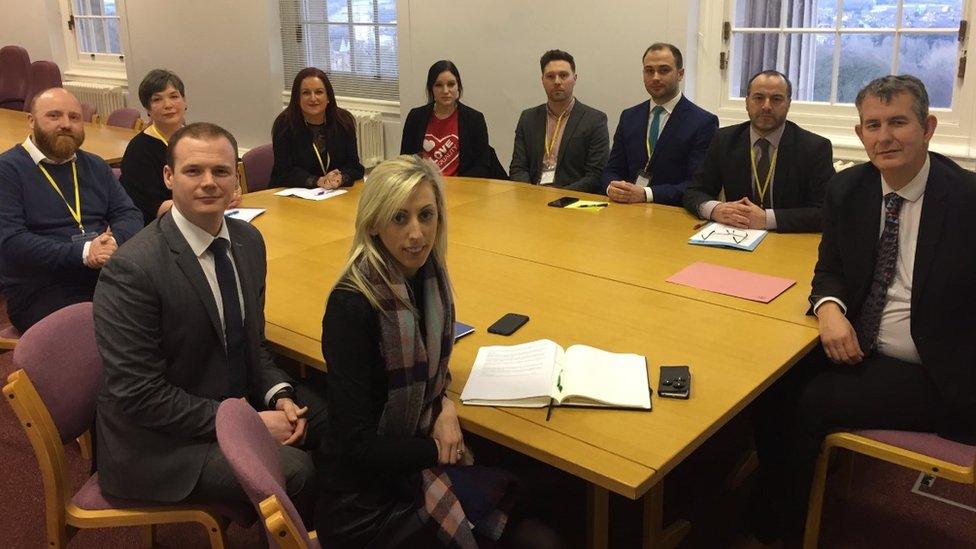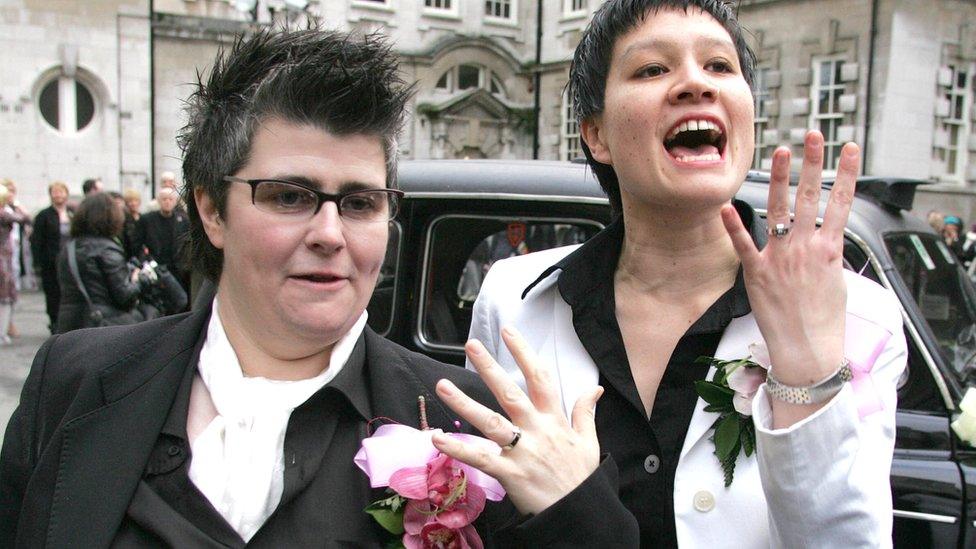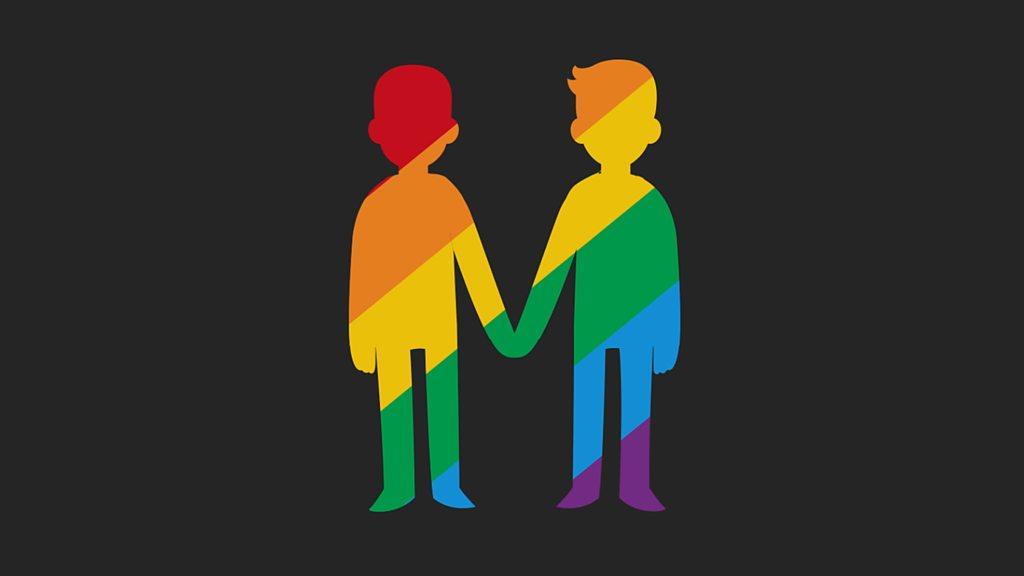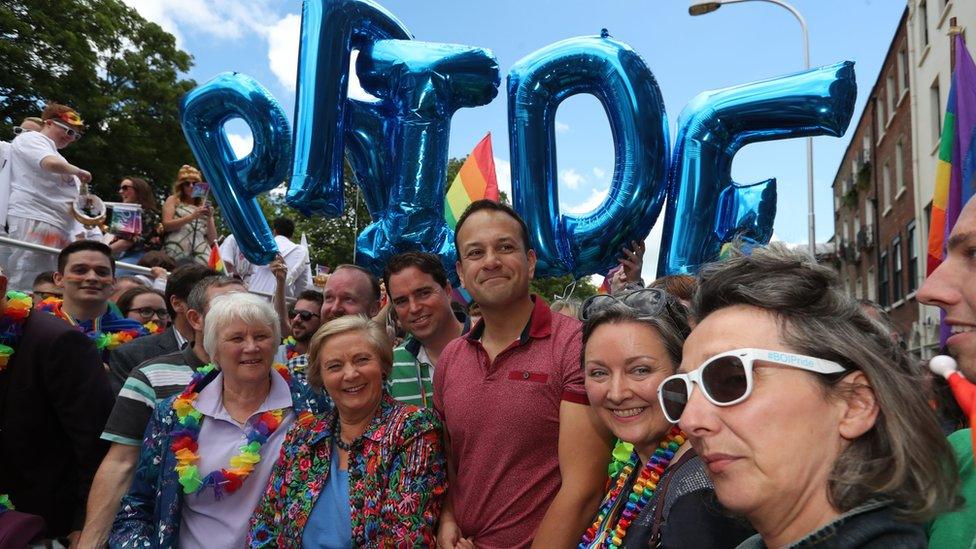Same-sex marriage campaigners 'disappointed' with DUP meeting
- Published

The DUP delegation was led by Edwin Poots (right)
Campaigners for same-sex marriage have welcomed the DUP's decision to meet them for the first time, but said they are bitterly disappointed with the outcome of their discussions.
The Love Equality group met a DUP delegation led by the former Health Minister Edwin Poots.
The group said the DUP told them they remain opposed to same-sex marriage.
The DUP said it was "useful exchange of views" but said it would "defend the current definition of marriage".
The campaigners said that as well as outlining their continued opposition, the DUP delegation also refused to make a commitment that they would not block legislation to introduce same-sex marriage in the future.

John O'Doherty from the Love Equality campaign believes reform of the petition of concern is needed for the assembly to work
Love Equality believes 56 of the current 90 MLAs would support the legalisation of same-sex marriage if the Northern Ireland Assembly returned.
However that majority could be derailed by a cross-community veto known as a Petition of Concern.
The DUP no longer has the numbers to secure such a veto on their own, but would require the assistance of two MLAs from outside the party.
The campaigners said they discussed the possibility of individual DUP MLAs who might privately back same-sex marriage being given the freedom not to sign a Petition of Concern in the future.
They said the DUP told them that in the past they had not "taken a three-line whip approach" to the issue.
'Respect and sensitivity'
The party's spokesman said: "The DUP has a mandated policy to defend the current definition of marriage.
"Lasting approximately 45 minutes, this was a useful exchange of views.
"The debate about this matter can be highly energised. We urge respect and sensitivity on all sides."
BBC News NI looks at the timeline of the same-sex marriage debate in Northern Ireland.
Members of the Northern Ireland Assembly have voted five times on whether or not to introduce same-sex marriage.
During the most recent vote in November 2015, MLAs voted to support same sex marriage for the first time, with a narrow majority of 53 votes to 52.
However, measure was blocked by the DUP using the petition of concern veto.
John O'Doherty from the Love Equality campaign said all the Stormont parties should in the future support reforming the Petition of Concern system as he does not see how the assembly can work effectively without reform.
The Love Equality campaign has already met a number of parties on the margins of the Stormont talks, but this was the first time the DUP has agreed to a meeting.
Allow X content?
This article contains content provided by X. We ask for your permission before anything is loaded, as they may be using cookies and other technologies. You may want to read X’s cookie policy, external and privacy policy, external before accepting. To view this content choose ‘accept and continue’.
Same-sex marriage remains illegal in Northern Ireland and it is one of a number of unresolved issues preventing a deal on devolved government.
Northern Ireland has been without a devolved government since the coalition led by the DUP and Sinn Féin collapsed last January.

Love Equality is made up of a consortium of organisations in favour of same-sex marriage
The Love Equality campaign is made up of a consortium of organisations which are calling for the introduction of civil marriage for same-sex couples in Northern Ireland.
Its members include Amnesty International Northern Ireland, the Rainbow Project, the Irish Congress of Trade Unions Northern Ireland, Here NI, Cara-Friend and the National Union of Students-Union of Students in Ireland (NUS-USI).
- Published17 August 2017

- Published10 February 2020

- Published25 June 2017
